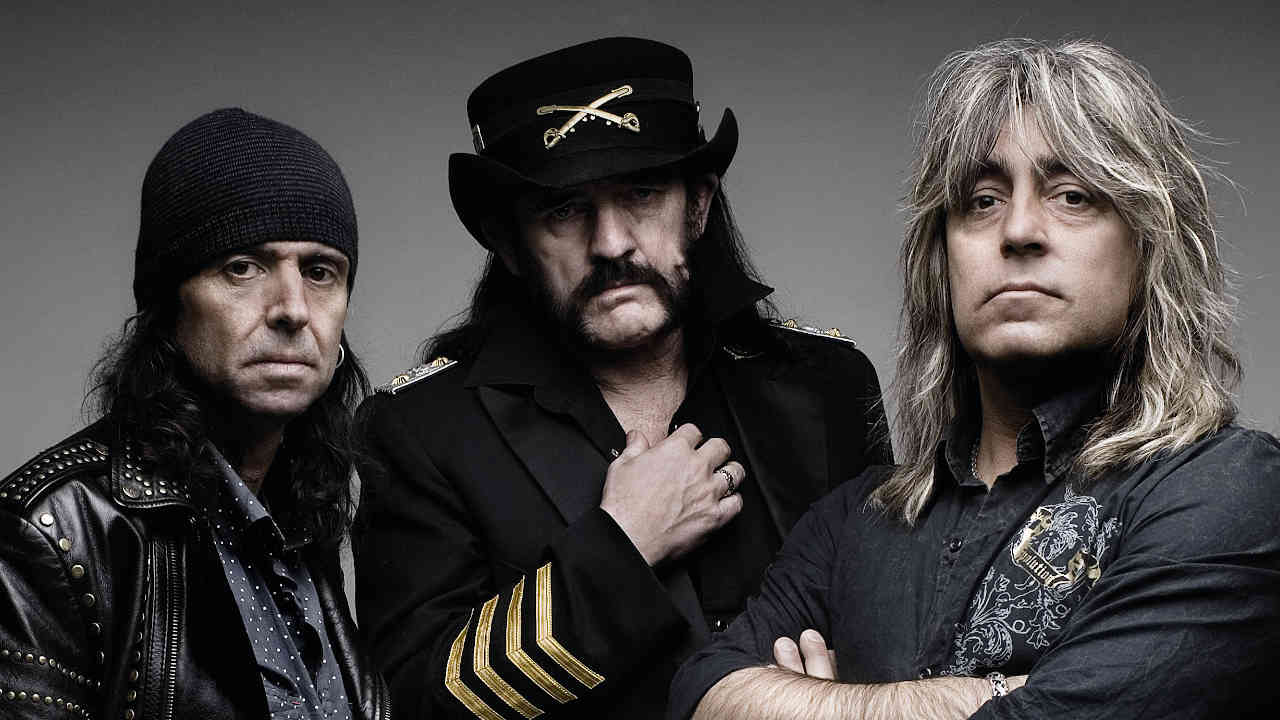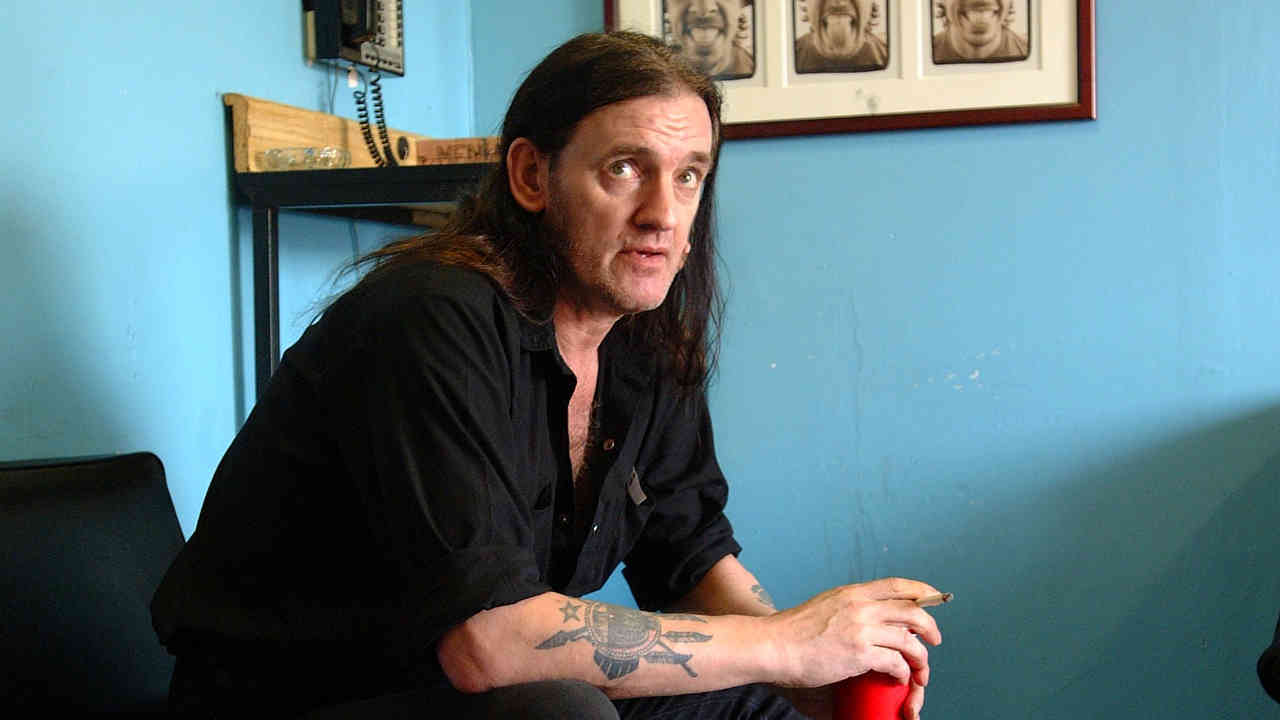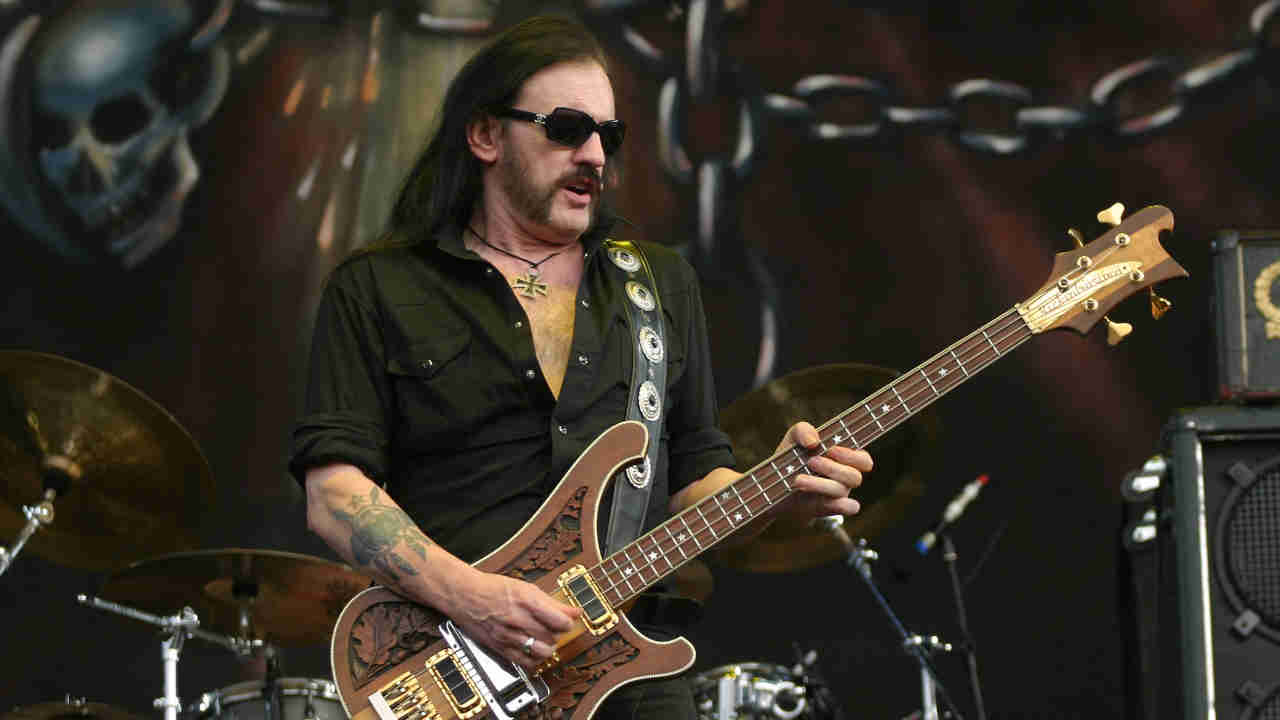
The intelligence of Lemmy Kilmister has never been in doubt, but the great man would be the first to admit that rock’n’roll and rocket science are plainly not the same thing. Some decisions in the life of a professional musician are as simple and intuitive as can be.
By the time Motörhead arrived in the 90s, it was apparent that Phil Campbell was an indispensable part of the band’s sonic tapestry and that Würzel really wasn’t. Increasingly detached from the creative process, Würzel left Motörhead by something approaching mutual consent, making the remaining trio’s decision to continue without bothering to replace him considerably easier. Let’s face it, the ‘classic’ Motörhead line-up was a three-piece, and when your music hinges on simplicity, brutality and unpretentious vigour, a six‑legged sonic attack is more than adequate.
Motörhead were now a trio for good: just, you suspect, as nature intended all along. Lemmy, Phil Campbell and Mikkey Dee. They were Motörhead and they played rock’n’roll. Simple.
Recorded with respected studio guru Howard Benson at the controls for the third time, 1996’s Overnight Sensation was no kind of radical departure and briskly maintained Motörhead’s momentum in laudably seamless fashion. It offered nothing in the way of jaw-dropping surprises and simply picked up where Sacrifice left off. Exemplified by rampaging opener Civil War and the acerbic charge of the title track, Overnight Sensation was a slightly heavier affair than its predecessor, but Würzel’s absence was a footnote rather than a talking point.

The most significant change in Motörhead’s world for this album was a newly minted arrangement with US record label CMC. That aside, this was business as usual: as loud, proud and obnoxious as ever, albeit with the added bonus of Lemmy’s harmonica skills on the distinctly lascivious Crazy Like A Fox.
Motörhead hit the road in support of Overnight Sensation early in 1997. During the summer, however, the band experienced problems on a co-headlining US jaunt alongside Blackie Lawless and W.A.S.P. Performing before the sleaze rockers as a matter of convenience, largely due to the fact that they, as Lemmy later explained, “couldn’t get the chicken feathers and fucking blood cleaned up quick enough”, Motörhead grew swiftly tired of their touring partners’ tendency to act as if they were the real headliners. As Phil Campbell said: “If there was a list of ten things you wouldn’t find in a Motörhead dressing room, Blackie Lawless would be at the top! Ha ha! We fucking hate that cunt. He’s a rubbish fat paratrooper and about as dangerous as Fozzie Bear.”
Two years on from Overnight Sensation, Motörhead released their 14th studio album in March 1998. In keeping with the band’s love for spontaneity, Snake Bite Love was written and recorded within a matter of weeks, again with Howard Benson at the desk, and it mirrored its predecessor’s hard-as-nails blend of heads-down belligerence and hulking turbo-blues.
Keen observers may have noticed that Motörhead seemed to be edging incrementally towards more metal-friendly territory at this point, not least on the thunderous Dogs Of War, but the album remained firmly in rock’n’roll territory for the most part and peaked on the grinding riff-fest of Joy Of Labour, wherein Lemmy posited the sinister query, ‘Do you want to look right in the Devil’s face?’ The song conjured the same sense of overpowering menace that first reared its horned head back on Orgasmatron in 1986.
In truth, Snake Bite Love did sound a little rushed and lacking in substance, but listened to at the right cranium-shattering volume, it still had the desired and intended effect. In its defence, Lemmy later stated that the trio were “always under the hammer. We’re very lazy in rehearsing. We never have anything ready! We pretend to rehearse, then we go to the studio and we’re trapped at the console with the producer glaring and people looking at their watches… but Snake Bite Love is one of the best albums we’ve made, I think. We don’t do filler.”
Amusingly, Motörhead managed to have a none-too-subtle dig at Prince in the liner notes to Snake Bite Love, where Phil Campbell’s name was represented by an incomprehensible squiggle and the explanatory moniker of ‘The Artist Frequently Seen At The Liquor Store’. The scamps.
After the release of their third live album, Everything Louder Than Everyone Else, in the spring of 1999, Motörhead may well have sensed that the impending new millennium offered them a chance to rejuvenate and redefine their now instantly recognisable squall of unreconstructed bedlam. Recorded in Germany and California during two snappy studio sessions, their first album of the 21st century would prove to be both one of the finest the band had produced to date, and a tantalising taster of the sustained artistic spurt that would ensure the Kilmister/Campbell/Dee line-up would finally be acknowledged as, at the very least, the equal of the line-up that made Ace Of Spades two decades earlier.
We Are Motörhead – an obvious statement, perhaps, but one worth restating ad infinitum – emerged in the spring of 2000, adorned with one of the finest and most gruesome pieces of artwork that long-time collaborator Joe Petagno has ever created for the band. The contents of the album certainly lived up to its outward appearance, with songs like face-melting opener See Me Burning and the short, sharp slap to the knackers of We Are Motörhead itself fizzing with renewed energy.
There was even room for a pulverising cover of the Sex Pistols’ legendary God Save The Queen. “I always loved the song,” stated Lemmy. “The Pistols were a real rock band. Steve Jones is one of the best rhythm guitar players in rock’n’roll.”
Oddly, for such an established classic, Motörhead’s version was almost universally well received, not least because the band’s affinity with punk rock has always been integral to their sound. Lemmy snarled the immortal line ‘There is no future in England’s dreaming’ like he meant it, too – but then he does live in Los Angeles, after all.
To counteract the seething fury of We Are Motörhead’s more vicious moments, the album also boasted one of the most bombastic ballads in the band’s canon, One More Fucking Time. This is a remarkably tender affair that, despite its sweary title, hints at a dash of vulnerability in Lemmy’s generally impregnable armour of proud humanity. ‘I will plead no contest if loving you’s a crime,’ he proclaimed. ‘So go on and find me guilty just one more fucking time.’
As ever, 1999 and 2000 were years dominated by on-the-road persistence from the Motörhead camp. There were tours of Europe during the spring of ’99, coinciding with that first recording session, and then across the US in the autumn, with Nashville Pussy as main support. This led to a slightly incongruous but highly successful second European tour under the banner ‘Monsters Of The Millennium’, with Dio and Manowar completing a formidable bill.

In October, Motörhead celebrated their 25th anniversary with a special show at London’s Brixton Academy. Guest appearances from Fast Eddie Clarke, Queen’s Brian May, Doro Pesch and several other friends of the band helped to make the event a successful one.
Unlike many other bands of their vintage, however, Motörhead have never been inclined to milk anniversaries too strenuously and despite recording the whole thing for posterity’s sake, the band returned to their usual touring life almost immediately, hitting the campaign trail in both Western and Eastern Europe as Christmas loomed.
In 2001, Motörhead would embark on one of their most perverse adventures, teaming up with WWE wrestling star Paul ‘Triple H’ Levesque and becoming, briefly, the unofficial house band for those preposterous, latex-sporting, muscle-bound bellends beloved of square-eyed American kids (and their apparently unashamed parents). The band wrote a new song, The Game, with World Wrestling Entertainment composer Jim Johnston and recorded it for use as Triple H’s new theme song. They even performed the song, a limping dud by their usual standards, live at Houston’s Reliant Astrodome during a high-profile WrestleMania event, somewhat appropriately on April Fool’s Day.
“I don’t particularly like wrestling,” stated Lemmy. “It’s a bit obvious for me, but at the same time there’s some great characters in it. It’s not actually a sport any more. It’s a show, a circus. It’s so awful… but some of that soap-opera bullshit is really quite funny. The guys we met connected to it are total gentlemen.”
If that wasn’t a strange enough meeting of minds, Lemmy’s appearance in a 2001 TV commercial for Kit Kats took, you might say, the biscuit.
Back in the real world of rock’n’roll, Lemmy and the boys hit the road once more for a tour of the UK and Ireland in May 2001, buoyed by the realisation that after the somewhat turbulent times of the 90s, when heavy music was in a state of flux and dominated by faddish sub-genres like grunge and nu metal, the times were definitely a-changing and moving in a more beneficial direction for such an established and revered band.
The resurgence of interest in genuine, balls-to-the-wall heavy metal may have been of little interest to Motörhead themselves, given Lemmy’s notorious insistence that his band were never a metal band in any meaningful sense, but the emergence of a new generation of kids who were both fascinated by metal’s past and newly able to delve into its history via the wonders of the internet (albeit illicitly) meant the band’s 16th studio album Hammered was released into a significantly different world than the one that had greeted their last few efforts.
By no means a flat-out classic, Hammered did contain a barnstorming epic in Walk A Crooked Mile, the swaggering Mine All Mine (featuring Guns N’ Roses’ Dizzy Reed on piano) and spoken-word denouement Serial Killer, which saw Lemmy join forces with Triple H again, their voices intertwined on a macabre piece of black poetry. Producer Thom Panunzio, renowned for his work with Bruce Springsteen and Alice Cooper, clearly employed the ‘if it ain’t broke, don’t fix it’ method of sound reproduction. Hammered delivered the goods with abrasive aplomb.
But as their popularity began to rise anew, Motörhead turned to the services of LA-based producer Cameron Webb. Having started his career as an engineer, working on hit albums by Limp Bizkit and Godsmack, Webb was not the obvious choice, but Lemmy took a shine to him – perhaps due to an introductory statement that he liked “to give people freedom in the studio, but I’m still gonna bust your balls” – and it only took the recording of 2004’s Inferno to establish an enduring and incredibly fruitful relationship for all concerned.
“One thing I learned really quickly as we got into pre-production is that Motörhead don’t do anything they don’t want to do,” Webb has since admitted. “Basically, you kind of give them a direction and have to gain their trust…”
Inferno would turn out to be the most critically acclaimed album that Motörhead had made in two decades. It may even be the best album they have ever made. Commencing with the piledriving Terminal Show, featuring a guest solo from shred-master Steve Vai, the band’s 17th album was a tour de force of adrenalised rock’n’roll. And it closed with Whorehouse Blues, a wholly acoustic and knowingly self-referential blues number, wherein Lemmy declared that ‘you know we ain’t too good lookin’, but we are satisfied’ – a telling synopsis of the Motörhead philosophy if ever there was one.

In 2005, Motörhead defied the odds by picking up their first – and only – Grammy award, for Best Metal Performance. Bizarrely, the award was given for a cover of Metallica’s Whiplash that was recorded for a tribute album, Metallic Attack: The Ultimate Tribute. The irony of receiving such a prestigious acknowledgement from the music industry, nearly 30 years into the band’s existence, for a song they didn’t even write, will not have been lost on Lemmy, Phil or Mikkey.
A great achievement, nonetheless, the award was another welcome boost and when Motörhead released Kiss Of Death in 2006, their momentum continued apace. More or less a repeat of the formula that had made Inferno such a bolt from the blue, the Kiss Of Death material again showed how finely honed the band’s songwriting tools were at this stage.
Their partnership with Cameron Webb was now firm and formidable, and 2008’s Motörizer again hammered home the efficacy of the collaboration, most notably on the two-minute ambush of Rock Out (‘…with your cock out!’ of course!) and anti-war anthem The Thousand Names Of God.
2010 would prove to be a very significant year for Motörhead. Firstly, Lemmy finally received the respect he deserved when directors Greg Olliver and Wes Orshoski unveiled their lovingly crafted rockumentary Lemmy. A revealing study of the man, myth and legend himself, the film featured impassioned testimonials from Slash, Duff McKagan, Nikki Sixx, Dave Grohl, Ozzy Osbourne and Metallica. The film was ridiculously funny, and was as honest and self-effacing as its star.
Secondly, as the year drew to a close, Motörhead would release their 20th studio album, The Wörld Is Yours. And from the savage, nuts-out I Know How To Die through to the crushing, slow‑motion grind of Brotherhood Of Man, the album proved that 35 years on from their formation, the band were still firing on all cylinders.
Most importantly, however, the case for Lemmy, Phil Campbell and Mikkey Dee as the ultimate Motörhead line-up had been more than made and regardless of anyone’s nostalgic affection for the days of Bomber and Ace Of Spades, those three men consistently and collectively embodied their band’s most admirable attributes for over 20 years, and produced some of the loudest, smartest and dirtiest music ever recorded along the way.
Originally published in Classic Rock Presents Motörhead







